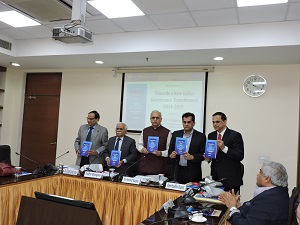On 11th March 2020, the Vivekananda International Foundation (VIF) held a book discussion on the book, ‘Towards a New India – Governance Transformed 2014-2019’, written by Mr V. Srinivas, Additional Secretary to Government of India in the Department of Administrative Reforms and Public Grievances, Ministry of Personnel, Public Grievances and Pensions. The discussants for the book were Mr Sudhir Bhargava, Dr Vinod Kumar Paul and Mr Amitabh Kant, CEO, NITI Aayog. Dr Arvind Gupta, Director, VIF in his welcome remarks, introduced the author and spoke about the contemporary relevance of the book. He opened the discussion by praising the author for providing a comprehensive view of key government policy measures from a bureaucratic and administrative perspective.
Mr Srinivas began the discussion by recalling how he was inspired to write the book because of his own experiences in the implementation of various welfare state policies. He stressed that India's welfare state programmes have undergone a massive digital transformation in the past five years. The three big projects that symbolize the rise of a New India are the opening of 31.6 crore Jan Dhan bank accounts, universal issues of 120 crore Aadhaar cards, and the construction of toilets to cover 85 per cent of the population. The purpose of the book, he said, is to trace the socio-politico history of Indian economy and polity from its inception till the current period and to mark out a roadmap for the future.
He further stated that the book depicts the success stories of the Swachh Bharat Mission, Ayushman Bharat, Jan Dhan Yojana, Ujjwala Yojana and Pradhan Mantri Aawas Yojana across the country. It throws light on the massive strides made under Digital India, Skill India and Make in India initiatives which are documented through interviews with the domain experts.
He added that the book also presents the challenges to good governance. The bulwark of good governance policies is accountability, transparency, stakeholder participation, judicial framework and fight against corruption. He highlighted the account of India's fight against corruption and how the “minimum government and maximum governance” approach has resulted in simplification of the governance model in recent years. He also posited the efforts initiated by the government in improving justice delivery systems by providing speedy disposal of pending cases, particularly through the digitization of the Revenue courts. While quoting the examples of e-Mitras and digital merchants, Mr Srinivas said that digital transformation is an important part of good governance. He concluded that the technology revolution in India has helped millions of Indians with transparency in governance. After the author concluded his remarks, Dr Gupta invited Mr Sudhir Bhargava to present his comments.
Mr Bhargava lauded the book as a concise and detailed account of various policy measures and their implementation challenges. He asserted that the book describes a way to make government schemes more effective by learning from previous successes and setbacks. He pointed out that the book presents the current government’s novel initiatives which have resulted in far-reaching positive changes to the Indian social and economic structure.
He noted that Digital India is an important theme in the book and the author has illustrated the relevance of Adhaar as a viable means of ensuring social justice by transferring benefits such as subsidies directly to the beneficiaries. Mr Bhargawa found the thrust on yoga and culture in the book to be quite illuminating. He noted that the book proposes yoga to be India’s soft power export and describes the measures undertaken by the government to propagate this culture. He deemed it as an important move to correct the power imbalance of the developed and developing countries with the cultural hegemony of the former going unchallenged until now. Mr Bhargawa concluded by congratulating the author on his brilliant book.
Furthermore, Dr Vinod Kumar Paul, Member NITI Aayog said that the book chronicles public sector reforms coming out of institutional economics, public administration, and from the communities of practice surrounding development agencies seeking to improve governance. He, especially, commended the author for highlighting the contribution of NITI Aayog in transforming India’s development agenda. The NITI Aayog has been entrusted with the mandate of re-imagining the development agenda by dismantling old-style central planning and has become a Knowledge and Innovation hub. He also appreciated the significance given to the Ayushman Bharat Yojna in the book. As it is a flagship scheme of the Indian government's National Health Policy which aims to provide free health coverage at the secondary and tertiary level to its bottom 40% poor and vulnerable population. He concluded by saying that it is an important project which puts health at the centre of the development debate.
Mr Amitabh Kant also presented his views on the book. He alluded to the series of pathbreaking reforms, unleashed by the PM Modi’s government, compiled in the book. He said the structural reforms, including GST, in terms of ending crony capitalism with the bankruptcy code, in terms of real estate reforms through RERA and in terms of direct benefit transfer will make India a very competitive and productively-efficient economy. He stressed that Digital India is a flagship programme of the Government of India with a vision to transform India into a digitally empowered society and knowledge economy. By integrating technology into various aspects of the economy, the government has generated vast volumes of datasets. It is imperative to use this data along with computing power and new algorithms to drive huge disruption. He concluded by saying that it is the only way in which India can radically leapfrog and catch up with advanced economies.
Dr Gupta, while concluding the discussion said that usage of the unprecedented availability of data effectively and productively is the need of the hour. There are a lot of avenues where the Indian government can leverage big data analytic for developmental plans. Second, policymakers need to appreciate that India needs to widen its reform process across social sectors, and particularly in Health and Education.










Post new comment